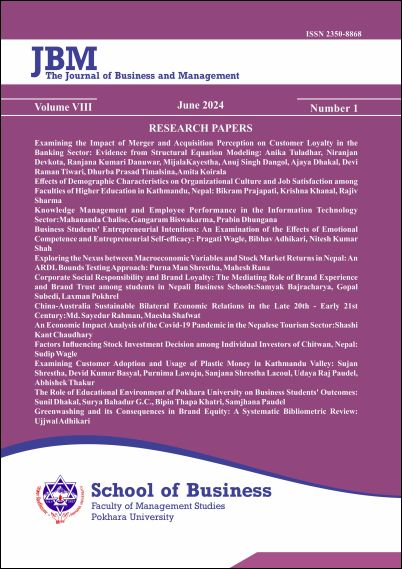Business Students’ Entrepreneurial Intentions: An Examination of the Effects of Emotional Competence and Entrepreneurial Self-efficacy
DOI:
https://doi.org/10.3126/jbm.v8i1.72120Keywords:
Emotional competence, Entrepreneurial intention, Entrepreneurial self-efficacyAbstract
Background: In this business led world, entrepreneurship has become one of the critical pillars of the economy. Entrepreneurial intention among business students is influenced by various psychological factors. Understanding these relationships could help to know what drives future entrepreneurs and how to prepare and support them through education and training programs.
Objectives: This study aims to find out the effect of emotional competence on entrepreneurial intention and to find out the mediating effect of entrepreneurial self-efficacy on emotional competence and entrepreneurial intention.
Methods: Using 174 valid responses from MBA students from Pokhara Valley, data was collected through non-probability convenience sampling. The research design is quantitative. Descriptive statistics (mean, median), multiple linear regression, correlation, frequency, percentages, Mann-Whitney U test, and histograms were used to analyze the data. Tables were used to interpret the results. However, the research is limited to the students of Pokhara, so it may not be able to represent all the students of Nepal.
Results: This study established that firstly, emotional competence positively affects entrepreneurial intention with a direct correlation of 0.391 and p-value of 0.001. Secondly, the indirect effect of emotional competence on entrepreneurial intention through entrepreneurial self-efficacy was significant and positive. EI-ESE-EC had p-value=0.006 which is significant at 95% confidence level with a t-score of 2.5076. So, there is a mediating influence of entrepreneurial self-efficacy. This research has only taken Emotional Competence and Entrepreneurial Self-efficacy variables to check its effect on Entrepreneurial Intention.
Conclusion: Emotional competence, entrepreneurial self-efficacy and family business exposure have a positive effect on entrepreneurial intention whereas age only influences a person’s entrepreneurial intention
Downloads
Downloads
Published
How to Cite
Issue
Section
License
Copyright © the School of Business. All rights reserved. No part of this volume may be reproduced or utilized in any form or by any means, electronic or mechanical, including photocopying, recording, or by and information storage and retrieval system, without permission in writing from the publisher.




